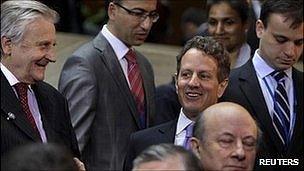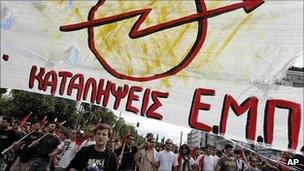Six weeks to save the euro
- Published
- comments

The British Chancellor of the Exchequer, George Osborne settled on six weeks as the window to save the European single currency.
It is, of course, an artificial deadline. It coincides with the G20 meeting in Cannes. Beyond that, there is not significance to six weeks. What it does do is to concentrate minds. And that was probably its purpose.
However, the past 18 months have been littered with meetings and summits to rescue the euro. Many have come with the billing that they are "crunch" gatherings. Communiques are issued that pacify the markets for days, until the small print is read. And then the realisation dawns that the big question has not been answered.
What happens if a big nation like Italy gets into difficulty? If it is too big to bail out - which currently it is - what impact will that have on Europe's banks? Will the eurozone break up in chaos and imperil what is left of the global recovery? So markets fret. So politicians and officials pledge to use "overwhelming force" to fix the problem.
Emerging from the IMF meeting in Washington is the broad outline of the latest plan. It broadly accepts that Greece will default. What it aims to do is to protect Europe's banks from the fall-out and to build up defences around Italy.
So, in the weeks ahead Europe's banks will be re-capitalised - though we don't know by how much. There will be huge efforts to boost the size of the EFSF - the main bailout fund. The EFSF already has been given extra powers and those are currently being debated by national parliaments. Its fire-power has been raised to 440bn euros (£380bn). The suggestion is that the fund needs to grow to 2 trillion euros.
How this will be done is not clear. But the mood is to pick up on an idea initially floated by the US Treasury Secretary, Timothy Geithner. At a meeting in Wroclaw he called for the existing fund to be leveraged so that it would be four or five times greater. How would this be done? No-one is sure, but the EFSF could act like a bank and draw on funds from the ECB.
So the proposed deal is re-capitalise the banks, expand the EFSF so it could protect even Italy, and prepare for a Greek default.
It is easy to sketch out such a scenario on headed hotel notepaper in Washington - and then there is politics, and reality.
Greece - a country only in name

Greeks may resist austerity if default is on the cards
Firstly, there is Greece. It finds itself pursuing a policy that almost no-one believes in. It is dishing out new austerity plans in the hope it will be given another bailout cheque next month. Finance Minister Evangelos Venizelos is increasingly seen as whistling on the deck whilst the passengers are making their escape. At the weekend he said "Greece is never going to default because that would be a catastrophe for the eurozone."
But, all around him, plans are being laid. The markets have already factored in a Greek default. Some 60% of the Greek people now expect a default. Built in to the new plan is the expectation that Greek debt will be cut by between 50% and 60%, so as to protect the eurozone.
So why, if default is in the offing, should the Greek people go along with the latest austerity plans? A poll suggests that already 48% of Greeks are unable to meet their extra tax burden. Yes, Greece will get the next tranche of the bailout money - 8bn euros - but that is only to buy time.
Greece remains dangerously unstable. "There is no doubt that we are living in wartime conditions," said Apostolos Tamvakakis, the CEO of the Greek National Bank.
The much repeated statement by Mr Venizelos that "Greece is and will always be a euro area member state" is so often repeated that it sounds desperate. The likelihood is that it will remain in the eurozone because of the difficulties of leaving. But it is increasingly a country only in name; its sovereignty has been traded away and its future will be decided by outsiders.
Dissent in Germany
Secondly, there is Germany. The EFSF bailout fund cannot be expanded without German approval. They are wary of giving the ECB more power. Even the German president has warned that there are risks to democracy in doing that. One of the attractions of the modern German state is its focus on the consequences for democracy.
This Thursday the Bundestag will vote on the extra powers for the EFSF agreed on 21 July. The expanded fund will raise German financial guarantees to 211bn euros.
The legislation will be passed. But that isn't the problem. For Angela Merkel the vote will test her authority. If she has to rely on the opposition for the votes she will be damaged and it could even lead to early elections. She needs 311 votes. Her coalition has 330 but she has rebels and they may still embarrass her.
If Angela Merkel comes through this test she may find herself having to tell the German people why more German treasure has to be deployed to defend the euro. She has already said that defending the single currency is a German national interest. The problem is the growing divide between the political class - the elite - and the people. The political class remains firmly committed to the European project. The public has become wary. More than 70% of the people are against further bailouts. If this latest plan is to fly, they will have to be won round.
It will be a long and difficult six weeks. The Americans, the British and a whole slew of commentators are using shock and awe to try to force the eurozone essentially to stand behind the debts of all its nations. It is a massive step with huge implications. The public - as so often happens in Europe - are spectators.